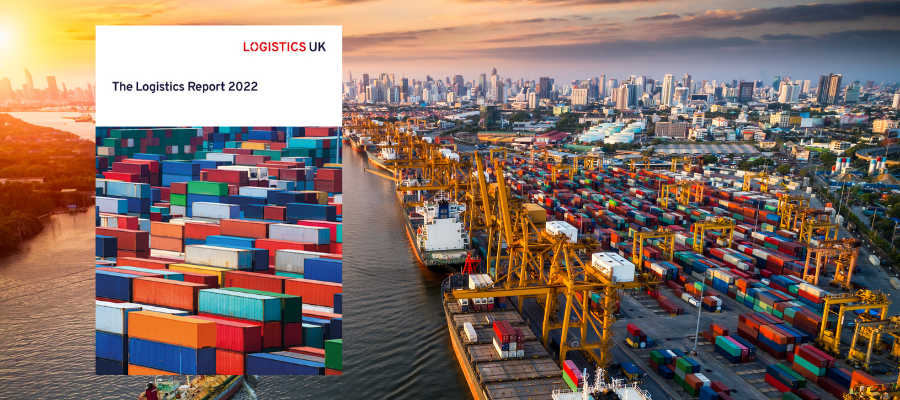🕒 Article read time: 2 minutes
Logistics – an industry navigating a changing landscape

As a key sector which underpins all areas of the economy, the UK logistics industry has adapted to pandemic pressures to maintain the flow of goods through supply chains in 2021, according to Logistics UK’s recently published Logistics Report 2022.
Despite a driver shortage leading to haulage availability challenges in the early part of the year, as the UK economy began to recover in 2021, logistics firms reported a positive outlook for the year ahead.
However, the UK economy is estimated to have contracted by 0.2% in April but grown by 0.5% in May 2022. Furthermore, prices have increased as costs pass through supply chains, resulting in headline inflation reaching 8.2% in June 2022. As a result, respondents to Logistics UK's latest Logistics Performance Tracker have reported lower positivity (3.5 out of 10 rating) for the UK Economic Outlook for the remainder of the year.
DECARBONISATION A KEY PRIORITY FOR LOGISTICS
Following the publication of the government’s Transport Decarbonisation Plan last year (July 2021), the deadlines for the phase out dates for non-zero tailpipe emissions cars, vans and HGVs have now been confirmed, making decarbonisation a key priority for logistics businesses. The report reveals that almost nine out of ten logistics firms (87%) are considering decarbonising their fleets and the routes they take to do so will vary for businesses depending on fleet size, the type of vehicle used and vehicle purpose.
“While there are many opportunities, there are also many challenges on the route to net zero,” said Michelle Gardner, Head of Public Policy, Logistics UK, “including which zero tailpipe emission technologies will be selected for larger vehicles, the high acquisition cost of purchasing the vehicles and when suitable recharging or refuelling infrastructure will be available nationwide. As targets and government deadlines move closer, the next 12 months will be crucial to ensure businesses can make significant net-zero emission progress.”
LOGISTICS REMAINS INTEGRAL TO UK ECONOMY
The logistics sector remains a key part of the UK economy, contributing £139 billion Gross Value Added (GVA) annually, but the way in which it operates is changing. The Logistics Report 2022 concludes that cost effective and efficient shipping is no longer guaranteed compared with the industry’s previous working model and its reliance on just-in-time management systems will need to shift to using greater storage capacity as pressure mounts on the existing delivery models. HGVs moved 11.3% and lifted 11.7% fewer goods in 2020 than in 2019 as coronavirus restrictions affected activity, and reduced capacity from disrupted supply chains forced many firms across all modal types to make efficiency improvements to meet the demand for logistics in 2021.
COMPETITION FOR AIR FREIGHT INTENSIFIES
Despite air freight rates increasing by 70% on some routes in 2021 as competition for bellyhold space intensified, with many passenger planes grounded during the year, global air cargo tonne/kilometres increased by 6.9% in 2021. This could be the result of several crises in other transport modes – such as port delays, the blocking of the Suez Canal and the skills shortage – resulting in business, customers and shippers favouring the reliability of air cargo to deliver for customers.
Gardner said: “As supply chain resilience becomes more important for customers, it will be interesting to see whether air freight will play a more prevalent role in businesses’ shipping plans, or whether its higher cost over alternative modes will impact this, especially given the increasing financial pressure businesses are facing as a result of rising operational costs.”
FOOD AND ENERGY PRICES SOAR
Overall, combating the effect of increasing costs will be a key focus over the next 12 months as the UK’s annual rate of inflation reached 9% in June 2022. The Logistics Report 2022 found that, in the first six months of 2022, food and energy costs – which were already high due to supply chain bottlenecks associated with COVID-19 restrictions – have been exacerbated by lockdowns in China, and Russia’s invasion of Ukraine. Russia and Ukraine previously accounted for around 29% of the global wheat export market, and oil prices, which had already increased as a result of post-pandemic demand, rose further as Russia’s invasion of Ukraine resulted in around three million barrels of Russian oil a day being pulled from global supplies.
DIESEL PUMP PRICES RISE BY OVER A THIRD
Forecourt diesel prices have surged by 34% since the start of the year; a sharp increase for businesses that are already facing other significant cost increases. Figures from the latest edition of Logistics UK’s Manager’s Guide to Distribution Costs show that total vehicle operating costs have risen by 17.7% in the twelve months to 1 April 2022. With financial pressures high, and businesses already operating on narrow margins, Logistics UK has written to the Chancellor to request a 6p per litre Fuel Duty reduction, which the business group estimates would result in an average saving of £2,424 per year, per 44-tonne truck. This call comes in addition to the 5p per litre reduction that was announced as part of the 2022 Spring Budget but was absorbed by rising wholesale fuel prices.
INDUSTRY’S RESILIENCE GIVES CAUSE FOR OPTIMISM
However, despite the many challenges brought about by the pandemic and rising prices, Gardner is keen to stress that there are many positives to take from the Logistics Report 2022.
“The number of people undertaking practical HGV tests has risen by 53.5% in Q4 2021 compared with Q4 2019 and the number of goods vehicle operator licences and van registrations increased during 2021, with road transport efficiency expected to improve in 2022,” she said, “And while the ongoing uncertainty over trading conditions continues to put pressure on the supply chain, given the industry’s resilience and adaptability, Logistics UK is confident there is cause for optimism in 2022 and beyond.”
*www.logistics.org.uk/logisticsreport
Published On: 11/08/2022 16:08:45

Comments Section
If you are a Logistics UK member login to add comments.